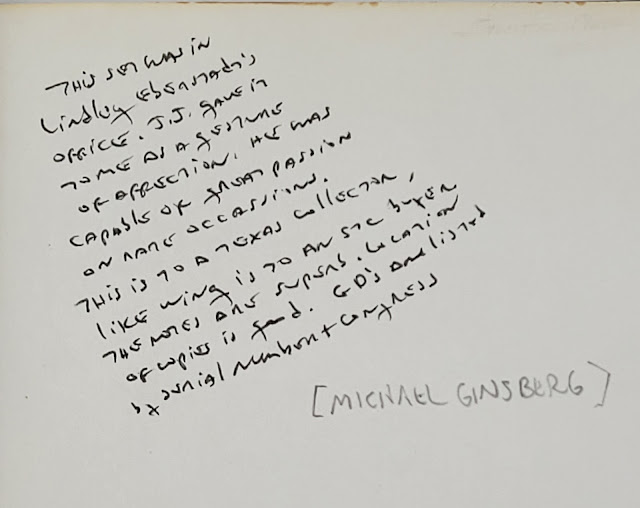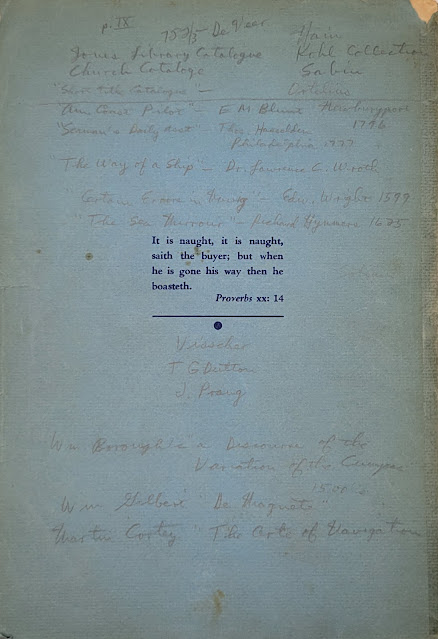Unbridled elation and bitter disappointment pretty much sum up the extremes of a book collector’s psyche. An instance of either is well-remembered. But when the two intertwine over the same book a story must be told, for that is my only relief.
The elation came at a cost, naturally. The book involved was H.P. Kraus’ A Rare Book Saga (1978). This copy is inscribed to Arthur Houghton, Jr., “To Arthur, the Great Collector, With best wishes, Hans, Sept. 12, 1978.”
Hans P. Kraus (1907-1988) was a budding bookseller in Europe but lost almost everything when he fled Nazi Germany after spending time in a concentration camp. He re-established his rare book business in New York in 1939. Within a decade, he was well on his way to becoming one of the most dominant rare book dealers in the world. In many ways, he assumed the mantle of A.S.W. Rosenbach in America. A Rare Book Saga recounts his trials and adventures set against the backdrop of a world in turmoil.
The recipient, Arthur Houghton, Jr. (1906-1990) was a famous bibliophile whom Kraus himself discusses below.
The seller was James Pepper, well-known West Coast book dealer, who has a discerning eye for important items and on occasion an unrestrained enthusiasm for pricing. However, he and I are on good terms, and I’ve enjoyed a couple fine conversations with him regarding specific books and the rare book trade in general. He also has a personal collection with many jaw dropping items, but that is his story to tell.
The asking price for Houghton’s copy of A Rare Book Saga was $750. Now biblio-ladies and gents that may not sound like a lot to ye collectors of Incunabula, High Spot Modern Literature, Western Americana, or Heralds of Science, but an inscribed copy of A Rare Book Saga typically sells for much less. I know because I’ve been the primary market for them, and I have six other inscribed copies. So, in my realm this was sticker shock. I put the book in my online “save for later” cart and tried to forget about it, buying a couple less expensive items that day to soothe my irritation.
But the mental gnawing began, like a rogue squirrel in an attic chewing on an exposed wire, at first relatively harmless, but then not so harmless, and we won’t get too graphic, but the finale did not go well for the squirrel, and my mental gnawing reached the point that for my own well-being, I had to buy the book. My wife Nicole found my excuse of mental anguish flimsy but acquiesced.
In retrospect, I now view this recent purchase as a bargain, a what-was-I-thinking-if-it-got-away item, a priceless relic of biblio-history, which it is. Kraus provides an account of buying Houghton’s Gutenberg Bible in A Rare Book Saga. Let’s let him tell it in his own words:
“What was the pinnacle of my bookselling career? What better encore, after buying and selling a Constance Missal, than buying a Gutenberg Bible, the king of all book rarities? . . . To buy a copy for stock, without immediate prospect of sale, was risky, considering monetary uncertainties and the threat of recession. No bookseller could tie up that much capital. Or so it was believed. The doubts persisted on that day in 1970, unforgettable to me, when the world learned of my acquisition of the Houghton copy.“On Monday, February 2, 1970, out of the blue Arthur A. Houghton [Jr.] called me at my office. He asked me to come for cocktails to his Sutton Place house. . . I knew Houghton and he wasn’t the sort to invite anyone for small talk. I had a hunch he might be ready to sell [his Gutenberg Bible], or at least explore the possibility, so I accepted the invitation.“Houghton, president of Steuben Glass, had started young as a book collector. I met him first in 1940, when he was curator of rare books at the Library of Congress. He is one of America’s great collectors and his library consists of rare and beautiful books and manuscripts that struck his fancy. . .“Houghton came right to the point. After exchanging amenities, during which he probably sensed that I knew what was coming, he announced:“’I want to sell the Bible.’“These words danced in my ears. . . Though hard negotiations might follow, I knew the book was mine.“The decision, he explained, had not been reached overnight. Houghton had owned a Gutenberg Bible, first the very incomplete duplicate of the Stadtbibliothek Trier bought at Sotheby’s in 1937 and then this one, for more than 30 years. His fascination with the book had not diminished in all that time, but his insurance company insisted he keep it in the bank and he did not want a book he could not keep at home. The urge to sell comes to many collectors, especially in a bull market. In 1970 the bulls definitely had the best of the antiquarian book trade.“I immediately made a substantial offer.“This took him by surprise. . .“’How will you pay?’ he asked.“’Cash.’
“This, too, proved a surprise. Not every bookseller is in a position to write out a seven-figure check.
“After minor bargaining, we reached a firm price. This was later reported in the press as ‘between one and two million dollars.’ I agreed with Houghton not to reveal the exact sum.”
Kraus garnered much publicity from owning the Gutenberg Bible. He eventually sold the book to the Gutenberg Museum in Mainz. Kraus wrote, “It is especially gratifying to us that our copy goes home, not only to the country but also to the city of its birth.”
My savoring of this special association copy of A Rare Book Saga continues and will continue but that doesn’t mean I’m not ready to add another unique copy to my holdings.
Thus, we come to the bitter disappointment. It involved an Ebay seller, but that won’t shock most, as Ebay is both a potpourri of amazing finds and squirrely misfires. A collector must keep an eye on the site though or miss out.
I did a regular online sweep of copies of A Rare Book Saga and noticed one offered on Ebay that instantly stirred my biblio-juices. Listed ostensibly by a UK seller with the handle of “plsshipfast,” this copy was inscribed by Kraus to the famous American bookseller Jacob Zeitlin (1902-1987) with a related letter from Kraus laid in. The inscription read, “To my good friend Jake, with best wishes, Hans.”
Kraus represented the German collectors Peter & Irene Ludwig in the transaction. They were important clients of Kraus. Zeitlin was agent for the Getty Museum who purchased the Ludewig Collection of 144 illuminated manuscripts for a reported forty-two million dollars (roughly one hundred and forty million in 2025 dollars). This filled a major gap in the Getty Museum’s holdings. In financial terms, this was the summit of both men’s bookselling careers. There are more details online about the transaction for those interested. But this brief synopsis shows why this association copy was so appealing to me. I needed it. I could just imagine it rubbing jackets—gently-- with the Houghton copy.
A hiccup happened when I hit the order button. The seller would not ship from the UK to the United States (and this was before tariffs). Oddly, the seller was also listed as being located in Houston, my hometown. In retrospect this incongruity was a yellow flag, but I was staring at the copy online with the illustrated inscription and letter and thinking you can’t get more copy specific than that, so let’s proceed. I emailed the seller, told them I was interested, and asked about options to get the book shipped to me.
In the meantime, my fervor for the book led to extreme proactivity. I went into deep thinking mode, got tired of doing that, took a break to eat, then came back to deep thinking mode, and my internal AI eventually produced an English contact that could order the book for me: Howard Mather of Wykeham Books. Howard is an experienced bookseller specializing in books about books, bibliography, the book arts and related subjects. I have never met him, but we have become epistolary friends. I’ve bought several nice association items from him over the years. I also found out during this adventure that he had been a corporate lawyer, and this escapade would eventually stir up his legal hackles.
I emailed Mather, told him of my predicament, asked him if he would order the book for me, ship it on, invoicing me for his services, including my contribution to his pub fund. In the meantime, I emailed the Ebay seller again and said I’d found a shipping solution so no worries.
Book time can move slowly when awaiting the arrival of an exciting acquisition. I tamped down the urge to check in with Mather for an update. The monetary amount involved was small beer, but the importance of preserving this copy a large one.
Mather’s first update arrived. He said the book has been mailed to him, but it is coming from Australia according to tracking information. Both of us were perplexed and we decided to just play it out. I was getting a sinking feeling.
A week later Mather’s second update confirmed the book’s arrival, but it is “a very average ex-library copy with stamps and tape marks.”
I let fly favorite expletives. Lots of them. However, we both held a glimmer of hope that perhaps they simply shipped the wrong copy.
The so-called seller replies to Mather’s concern and inquiry:
“To clarify once more, the listing was for a Used – Good condition copy, and the images were intended as stock photos for reference only. While some listings may include extras like inscriptions or letters, these are not guaranteed unless specifically stated in the written description. [my italics].
Mather responded to the message, “No. That is wholly unsatisfactory and unless you resolve this properly now, I shall be forced to leave very negative feedback and raise the matter with Ebay. As for ‘While some listings may include extras like inscriptions or letters, these are not guaranteed unless specifically stated in the written description.’ I happen to have been a corporate lawyer for 20 years and this made me laugh. Kindly tell me where to send the book and send me a full refund without delay.”
The seller eventually complied after more vigorous correspondence, the book was returned, and Mather was refunded the money. I felt horrible to have gotten Mather mixed up in this, and I appreciated his professionalism the whole way through.
This episode served to remind me that an online journey into the biblio-unknown, usually the most rewarding of desk-bound adventures, can occasionally be arduous and frustrating.
Yet someone, somewhere has the Zeitlin copy. Where art thou, A Rare Book Saga? You should be on my shelves nestled next to Mr. Houghton’s copy. Eternally optimistic I remain, as all collectors must be, and I await your re-discovery and arrival.
This essay first appeared in my column in the FABS Journal, Fall 2025.
 |
| Where art thou? |











